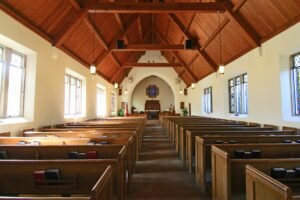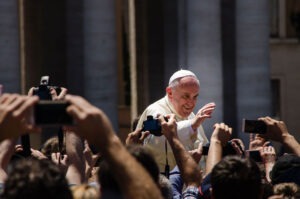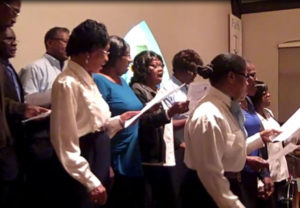
September 14, 2015; Gothamist and WBAL-TV (Baltimore, MD)
The Pope’s famous and controversial encyclical Laudato Si’ focuses on humanity’s desecration of the global environment, but it also contains a striking challenge to the core tenets of the capitalist system, the willingness of so many to look at anything and everything as an opportunity to make money no matter what the consequences.
Would it be a surprise to learn that the people are making all sorts of money off the Pope’s visit to the U.S.? Some of the profiteering is of the petty sort, albeit pretty reprehensible. In New York City, some lowlifes are reselling the free tickets they got to see the Pope’s Central Park process for $750 each on Craigslist. Baltimore’s WBAL reports that scalped tickets are being offered for as much as $1,000. eBay has prohibited sales of tickets to see the Pope, but Craigslist has not yet done the same, as far as we know.
Creatively, funny, but still questionable are the t-shirt sellers like faithadelphia.com, hawking “Yo Pontiff” and other t-shirts for $20 or more a pop and promising “a portion of all sales to designated Catholic Children’s Charities in the Philadelphia region.” How much of the sales price and which charities will benefit is information available on request to the company, owned by “Clothing Scott” Soffen.
A ticket scalper, a t-shirt hawker, even a homeowner making a home available for a couple of thousand a night to people visiting Philadelphia to see the Pope (the average rental in Philadelphia during the Pope’s visit listed on HomeAway is $1,690 a night, eight times the average normal rate) are small potatoes compared to the financial benefit—or perhaps the even more important reputational benefit—some corporations are seeking from getting close to Pope Francis.
Some of the corporate involvement is a bit more difficult to understand. For example, the officially approved merchandising vendor for the World Meeting of Families Congress is the Philadelphia-based Aramark Company. Its “pop-up Pope shops” are selling commemorative pins, plush dolls of the Pope ($20), life-sized cardboard cutouts of the Pope ($160), a sterling silver cross ($500), and commemorative rosaries (running from $10 to $200). Aramark also happens to run prison kitchens all across the country, though no longer in Michigan, where authorities found Aramark food with maggots and other unpalatable offerings, according to Alan Pyke for ThinkProgress. The Pope is scheduled to visit the Philadelphia city jail, whose kitchen is an Aramark-contracted operation.
Sign up for our free newsletters
Subscribe to NPQ's newsletters to have our top stories delivered directly to your inbox.
By signing up, you agree to our privacy policy and terms of use, and to receive messages from NPQ and our partners.
A nonprofit called “In the Public Interest” released information about an array of companies with contracts at Philadelphia’s Curran-Fromhold Correctional Center, including Aramark and Corizon, among others, that are private contractors with “horrible track records.” ITPI’s executive director, Donald Cohen, described the history of Corizon and other for-profit companies at the prison with “providing low-quality services, harming not only prisoners, but communities and taxpayers as well.”
New York City mayor Bill de Blasio declared the ticket scalping as “truly disturbing” and “absolutely inconsistent with everything the pope stands for.” However, the message of what Pope Francis might stand for vis-à-vis the economic system that animates both t-shirt makers and Aramark is a little fuzzy to some people. “We live in a free-market economy, and we can understand why some might want to offer their homes for personal gain,” said World Meetings of Families spokesperson Rachael Harleman in a statement on the issues of home rental speculation during the Pope’s visit to the city of brotherly love. “As for what private individuals are planning in terms of property rental fees—we cannot speculate on that nor can we control it.”
Pro-business Catholics such as the membership of Legatus are doing their best to divine the pro-business side of Laudato Si’, as this commentary from Marcellino D’Ambrosio strives to demonstrate: “An exclusive focus on short-term gain is bad business. Bringing products to the marketplace that harm the public and the environment—this too is bad business. Failure to invest in the development of one’s employees is bad business. This is the kind of business that Francis condemns,” D’Ambrosio writes. “But the Holy Father praises creativity in the marketplace that serves the public, develops the workforce, and expands the pie for all.”
Nonetheless, other pro-business observers, such as radio talk show host Rush Limbaugh, view the Pope as anti-business, with Limbaugh himself declaring Pope Francis a “Marxist” because of the critique in Laudato Si’ that says, in Limbaugh’s interpretation, that “unfettered capitalism is destroying the world and…the rich countries have to give more money to the poor countries to make amends.” Worse than Marxist, Limbaugh declared that the encyclical sounded “just right out of the Democratic Party.”
The test will be not how the Pope responds to the profiteering, but the message coming from the dioceses of Washington, Philadelphia, and New York City. Let’s see when ordinary citizens complain about price gouging in the housing market and when political observers challenge the Church on getting too close to prison contractors. Laudato Si’ contains potential responses, but the American archdioceses will be judged on how they respond to hometown corporations (like Aramark in Philadelphia) after the Pope has returned to Rome.—Rick Cohen











